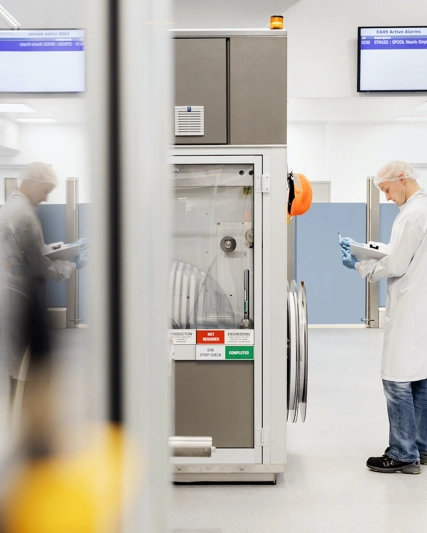GSK and Microsoft, in collaboration with the Centre for Health and Disease Studies, launch disease surveillance project in Nepal
Issued: London, UK
For media and investors only
- Climate change is impacting the spread of known and novel pathogens, especially mosquito-borne diseases
- New partnership combines expertise across Biopharma and Tech sectors to support local health interventions and help accelerate elimination of mosquito-borne disease in Nepal
- GSK to contribute expertise in health and disease and Microsoft to deploy Premonition “biological weather stations” for early detection and management of pathogens using state-of-the-art AI and robotics
GSK plc (LSE/NYSE: GSK) and Microsoft (Nasdaq: MSFT), in an innovative collaboration with the Centre for Health and Disease Studies (CHDS) Nepal, today announced the start of a disease surveillance project in Nepal. The pilot project, which will leverage Microsoft’s Premonition systems and GSK’s expertise in health and disease, will investigate how AI and robotics can support local community response to vector-borne diseases and climate change.
Climate change poses a growing threat to the health of the planet and the health of people. One threat is the increasing transmission and spread of vector-borne diseases, caused by pathogens transmitted by mosquitoes and other species, such as malaria and lymphatic filariasis (LF). Vector-borne diseases are especially susceptible to climate-driven spread and for many underserved communities are a significant cause of ill-health, placing a substantial toll on health systems and contributing to ongoing inequality. As a result, there is an urgent need for improved disease mapping and disease surveillance protocols.
To help inform local decision-making and build more resilient health systems, Microsoft Premonition systems were shipped to Nepal earlier this month to form a network of “biological weather stations” spanning three distinct habitats. These systems incorporate advanced optical sensing and smart robotics to monitor insect species and collect biological samples on how changing climate impacts disease transmission. With the support of GSK’s expertise in disease prevention, funding, and global and local healthcare partnerships, this collaboration will co-ordinate the deployment and management of the Premonition systems.
It’s anticipated the project will help develop new monitoring strategies to detect and manage disease threats early, especially in underserved communities where outbreaks may be detected too late. The project is also expected to demonstrate autonomous monitoring and robotic sampling of dangerous species in remote environments. If successful, the ambition is to engage new partners and expand to other countries.
Thomas Breuer, Chief Global Health Officer, GSK, said: “The health impact of climate change is currently most acutely felt by underserved communities, and as climate change progresses its impact could be felt globally. To get ahead of disease together, we’re committed to finding science-based solutions to support vulnerable people adapt to the health impacts of climate change. This project is a great example of what is possible when innovative companies from different sectors come together with local communities to develop solutions for urgent climate-related healthcare challenges.”
Brad Smith, President and Vice Chair, Microsoft, said: “New technologies play an important role in building society’s ability to respond and adapt to the disruption caused by climate change. Combining Microsoft Premonition technology, deep health and disease expertise from GSK, and the leadership of public health organizations in Nepal will equip local decision makers with new data-driven insights to help prevent, plan, and prepare for challenges ahead.”
Deena Shrestha, Chairperson, Centre for Health and Disease Studies Nepal, said: “This project is a wonderful opportunity to use our local knowledge and resources and work with the Microsoft Premonition devices in our diverse country first hand. We are excited to expand these monitoring capabilities and gain deeper understanding about the impact of climate on vector behaviour and disease transmission. As a biomedical and public health research based NGO, it is a pleasure working alongside the Ministry of Health and Population, GSK, Microsoft and other experts in this field and we look forward to the outcome of this research.”
About vector-borne diseases
Vector-borne diseases are infections transmitted by the bite of an infected arthropod species, such as mosquitoes. Weather and climate, alongside other factors, can influence the survival and spread of vectors, in turn influencing the rates of pathogen activity.1 Lymphatic filariasis and malaria are two examples of vector-borne diseases.
About Climate Week NYC
Climate Week NYC is the time and place where the world gathers to showcase amazing climate action and discuss how to do more. Run by the international non-profit Climate Group, in partnership with the United Nations and the City of New York, Climate Week NYC annually brings together voices from across the spectrum to debate and implement climate action. With over 500 events taking place as part of the official events program and hosting the most significant leaders from business and government, Climate Week NYC is one of the largest annual climate summits of its kind attracting global awareness and participation.
About GSK
GSK is a global biopharma company with a purpose to unite science, technology, and talent to get ahead of disease together. Find out more at gsk.com/company
About Microsoft
Microsoft (Nasdaq “MSFT” @microsoft) enables digital transformation for the era of an intelligent cloud and an intelligent edge. Its mission is to empower every person and every organization on the planet to achieve more.
Cautionary statement regarding forward-looking statements
GSK cautions investors that any forward-looking statements or projections made by GSK, including those made in this announcement, are subject to risks and uncertainties that may cause actual results to differ materially from those projected. Such factors include, but are not limited to, those described in the Company's Annual Report on Form 20-F for 2021, GSK’s Q2 Results for 2022 and any impacts of the COVID-19 pandemic.
References
[1] ECDC. (2022). Vector-borne diseases. Available at: https://www.ecdc.europa.eu/en/climate-change/climate-change-europe/vector-borne-diseases. Accessed September 2022.


